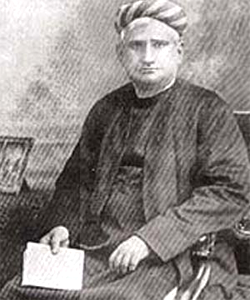Dec 30, 2025
Dec 30, 2025
 Bankimchandra Chattopadhyay (1838-1894) is known chiefly as a novelist and the author of Vande mataram, the war cry of the freedom fighters, now the national song. But he was much more than that. Unfortunately we do not bother to know the other aspects of the personality of this great man. Here is his hundred-odd pages long essay – Bangadesher krishak (The Peasants of Bengal) - in my translation (the first few paragraphs of the first chapter in full and the rest in summary), which will show one of those aspects - his concern for the poor peasants of our country. Its first part was published in the jaistha/asad 1280 BS (1873-74) issue of Bangadarshan or The View of Bengal, the periodical journal started and edited by him. It needs to be mentioned here that in 1873 a major agrarian riot took place in the district of Pabna when five zamindars purchased the Natore zamindari and attempted to increase the rent. He wrote this essay before the Pabna riot from his first hand knowledge and experience as a Deputy Magistrate. Above all he was a seer.
Bankimchandra Chattopadhyay (1838-1894) is known chiefly as a novelist and the author of Vande mataram, the war cry of the freedom fighters, now the national song. But he was much more than that. Unfortunately we do not bother to know the other aspects of the personality of this great man. Here is his hundred-odd pages long essay – Bangadesher krishak (The Peasants of Bengal) - in my translation (the first few paragraphs of the first chapter in full and the rest in summary), which will show one of those aspects - his concern for the poor peasants of our country. Its first part was published in the jaistha/asad 1280 BS (1873-74) issue of Bangadarshan or The View of Bengal, the periodical journal started and edited by him. It needs to be mentioned here that in 1873 a major agrarian riot took place in the district of Pabna when five zamindars purchased the Natore zamindari and attempted to increase the rent. He wrote this essay before the Pabna riot from his first hand knowledge and experience as a Deputy Magistrate. Above all he was a seer.

|
After I saw that picture of the tribal girl in the newspaper for a few days I could not sleep. After the achievement of independence Gandhiji wanted to disband the Congress party and he was left by his followers alone to pray, nay, he was killed. In a democratic society his most favourite follower established a ruling dynasty. Others followed suit. They have forgotten what Gandhiji dreamt. We adopted Vande mataram as our national song, otherwise we forgot everything else that Bankimchandra told. Nobody reads his essays where he talked about the poor and the establishment of an egalitarian society. Rabindranath sacrificed his everything for his country and his people. Now look at that institution, the first of its kind in the world! His Nobel medal we have stolen and CBI simply did nothing to catch the thieves. And mind it, the PM of our country himself is the chancellor of Viswabharati which has become a den of vandals. Dear Dipankar, the way we are dealing with the so-called maoists - I just don't understand - have we gone mad! The famous movie The Deer Hunter ends with the song - God bless America! So we should say - God bless India! |

|
As I was reading this piece, I kept on asking myself exactly the same question with which you have ended the post. Has anything changed at all? I am afraid that the answer is a solid NO. Each and every politician keeps accusing each and every other politician that the people have been neglected. Unfortunately, I don't think that they care anymore for the people than the Britishers did. They are merely after political power. The British had fleeced us and enriched their own country. To that extent, they had served the cause of their own country. For us alas, people who are going hoarse crying about the infinite pain of the poor are engaged in increasing their salaries in the Parliament. I feel that there should be a rule that each parliamentarian or member of legislative assemblies has to live continuously for one year in the same state of abject poverty in which the god forsaken people of our country live in remote villages. No helicopters, no cars, no administrative staff, no nothing to be provided to them. Let them try and find out who it is that they are trying to uplift. This essay has great relevance. |